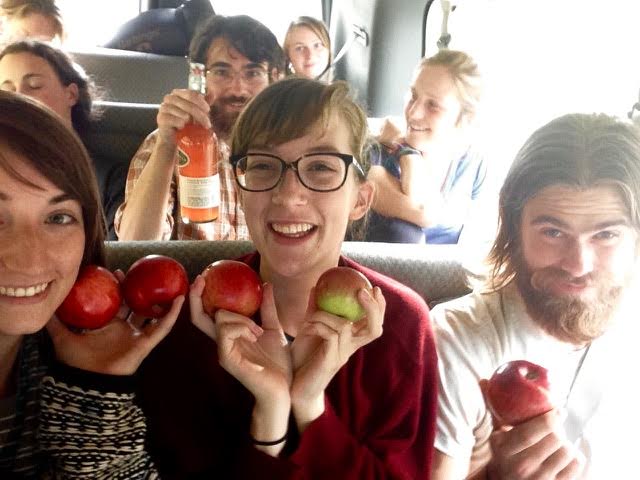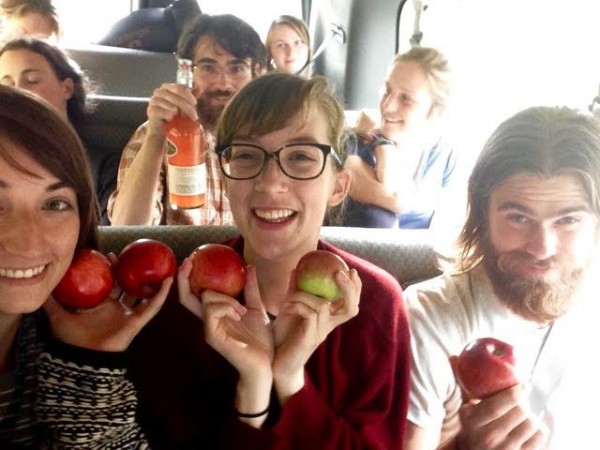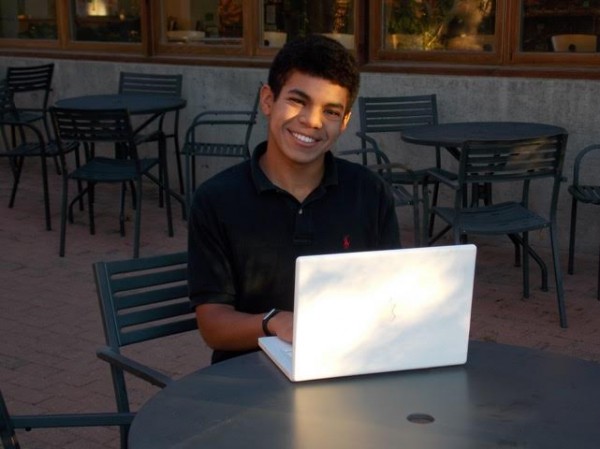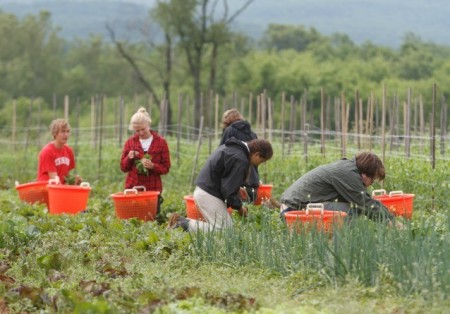Dickinson College Fall Open House
High school juniors and seniors, join us for a Discover Dickinson Fall Open House. Learn more about the academic experience from our faculty and current students. Tour campus and eat lunch in the dining hall. Hear from admissions and financial aid representatives, as well as from Dickinson’s senior administrators.
10:00 a.m. Welcome and Opening Remarks
10:30 a.m. Academic Inquiry at Dickinson
(you will have the opportunity to choose from one of the following panels)
- Dickinson’s Distinctive Approach to the Social Sciences
- Dickinson’s Distinctive Approach to the Natural Sciences
- Dickinson’s Distinctive Approach to the Arts and Humanities
11:30 a.m. Campus Tour
12:45 p.m. Lunch in the Dining Hall
1:45 p.m. The Dickinson Experience: Hear from Our Students
2:30 p.m. Conversation about Admissions and Financial Aid
2:30 p.m. Forum (optional group interview for high school seniors)
3:00 p.m. Closing Reception
Dickinson College Fall Open House
High school juniors and seniors, join us for a Discover Dickinson Fall Open House. Learn more about the academic experience from our faculty and current students. Tour campus and eat lunch in the dining hall. Hear from admissions and financial aid representatives, as well as from Dickinson’s senior administrators.
10:00 a.m. Welcome and Opening Remarks
10:30 a.m. Academic Inquiry at Dickinson
(you will have the opportunity to choose from one of the following panels)
- Dickinson’s Distinctive Approach to the Social Sciences
- Dickinson’s Distinctive Approach to the Natural Sciences
- Dickinson’s Distinctive Approach to the Arts and Humanities
11:30 a.m. Campus Tour
12:45 p.m. Lunch in the Dining Hall
1:45 p.m. The Dickinson Experience: Hear from Our Students
2:30 p.m. Conversation about Admissions and Financial Aid
2:30 p.m. Forum (optional group interview for high school seniors)
3:00 p.m. Closing Reception
Dickinson College Fall Open House
High school juniors and seniors, join us for a Discover Dickinson Fall Open House. Learn more about the academic experience from our faculty and current students. Tour campus and eat lunch in the dining hall. Hear from admissions and financial aid representatives, as well as from Dickinson’s senior administrators.
10:00 a.m. Welcome and Opening Remarks
10:30 a.m. Academic Inquiry at Dickinson
(you will have the opportunity to choose from one of the following panels)
- Dickinson’s Distinctive Approach to the Social Sciences
- Dickinson’s Distinctive Approach to the Natural Sciences
- Dickinson’s Distinctive Approach to the Arts and Humanities
11:30 a.m. Campus Tour
12:45 p.m. Lunch in the Dining Hall
1:45 p.m. The Dickinson Experience: Hear from Our Students
2:30 p.m. Conversation about Admissions and Financial Aid
2:30 p.m. Forum (optional group interview for high school seniors)
3:00 p.m. Closing Reception
Discover Dickinson Day
Designed for first-time visitors, this ideal introductory look at Dickinson features a welcome, tour of our historic campus, lunch in the Dining Hall and an opportunity to learn more about the admissions and financial-aid process. Come learn more about the distinctiveness of the Dickinson experience.
Important Note: If you are planning your visit after the registration deadline has passed, you cannot use the online registration tool to register. To schedule your visit, please call the Office of Admissions at 717-245-1231 or 800-644-1773.
8:45 a.m. Welcome
9:00 a.m. Campus Tour
10:15 a.m. Distinctively Dickinson Presentation
11:00 a.m. Lunch in the Dining Hall
12:00 p.m. Admissions and Financial Aid Q&A (parent session)
Unpacking the Admissions Process (student workshop)
Discover Dickinson Day
Designed for first-time visitors, this ideal introductory look at Dickinson features a welcome, tour of our historic campus, lunch in the Dining Hall and an opportunity to learn more about the admissions and financial-aid process. Come learn more about the distinctiveness of the Dickinson experience.
Important Note: If you are planning your visit after the registration deadline has passed, you cannot use the online registration tool to register. To schedule your visit, please call the Office of Admissions at 717-245-1231 or 800-644-1773.
8:45 a.m. Welcome
9:00 a.m. Campus Tour
10:15 a.m. Distinctively Dickinson Presentation
11:00 a.m. Lunch in the Dining Hall
12:00 p.m. Admissions and Financial Aid Q&A (parent session)
Unpacking the Admissions Process (student workshop)
Fall 2015: EcoLeague Exchange Students On The Move!


Claire Jordy (center) returning from a 2-day field trip to Vermont to study apples as part of the course “The History of Apples”. Claire is currently on exchange to COA from Dickinson.
by Jazzy DiMeglio, EcoLeague Writing Intern
What moves us, physically and figuratively? For one student, it might be an interest in apples that sparks an entire track of education. For another, a passion for soil and social justice that inspires plans for urban farming. Or perhaps it is simply a change of place that refreshes our perspective.
Claire, Emmanuel, and Elena are three of fifteen students participating in the EcoLeague exchange program this fall. A consortium of six different liberal arts colleges across the country, the EcoLeague allows students to shift their studies to another school for a semester or two during their undergraduate career. Located in different bioregions and with unique campus cultures, each EcoLeague college remains connected to the others by core values of environmental awareness, social change, and sustainability. While exploring new ecosystems, new communities, and new academic courses, the EcoLeague student is challenged to develop skills and perspectives that will not only enrich their education but also prepare them for life after college.
“I feel like I’m making a tool box,” says Claire Jordy, a junior, majoring in Environmental Studies. Currently, Claire is studying on the brisk shores of Bar Harbor, Maine, at College of the Atlantic. Although less than half the size of Dickinson College, her “home” school, COA still offers unique courses that she wouldn’t be able to take at home. Learning new skills she will be able to apply to her senior project is a major benefit of participating in an EcoLeague exchange.
“COA offers more ‘site specific’ courses,” she says. One class that drew Claire to the college is “The History of Apples.” In this course she and her classmates learn how to identify apples of the region and study the importance of preserving seedling variety. Claire dreams of one day owning her own orchard, so “The History of Apples” is especially relevant to her future aspirations. Additionally, at COA, Claire is able to work on anthropologic research methods, which she plans to use for a capstone project at Dickinson. Aside from the academics, another highlight of the EcoLeague experience for Claire has been living in a new setting. Though a bit chilly, she likes swimming in the Atlantic Ocean and hiking in the mountains of Arcadia National Park.
While Claire enjoys unique courses and exploring new landscapes in Maine, Emmanuel Greeno is developing a deeper appreciation for his home of COA while studying in Arizona this semester.

Emmanuel Greeno enjoys working outside in the surprisingly mild temperatures of Prescott, Arizona. Greeno is currently on exchange to Prescott from COA.
“I like the academics and the people here, but I really love my ‘home’ school even more now,” says Greeno of his experience at Prescott College. Also a junior, Emmanuel is on track to graduate with a Bachelor of Arts in Human Ecology, the self-directed, interdisciplinary degree that is COA’s trademark. Although immersing himself in a new community has been a high point for Emmanuel, it has also been a challenge. Prescott conducts most of its classes in the field and the majority of its students live off-campus, a sharp contrast to COA’s island location where most undergraduates are in close proximity to one another. At his home school of roughly 350 students, the community is very tight-knit, something he misses at Prescott. One place he notices this difference is in Prescott’s dining cafés, which are set-up restaurant style. Emmanuel describes eating as a “human ritual” and misses the cafeteria at COA, which is not only a place to eat, but also a place to “take a break” and connect with others.
Despite these differences, Emmanuel is enjoying his time in Arizona. A major plus for him is the academic structure available at Prescott. This semester he is taking all psychology courses. He likes that at Prescott, the psychology classes are already “established” and he can simply enroll in them, rather than having to construct a course on his own through independent study.
Going home with a fresh perspective is something else Emmanuel looks forward to adding to his education, much like Elena Santos, who has traveled from Green Mountain College in Poultney, VT to Dickinson College in Carlisle, PA for the semester. With hopes of one day starting an urban farm, Elena chose to go on an EcoLeague exchange to help her accomplish this goal. By pairing her studies in Sustainable Agriculture and Food Systems at GMC with sociology-based courses at Dickinson, she feels more prepared to farm in cities with diverse populations.
“There are a lot of perspectives at Dickinson that aren’t available at Green Mountain,” she says. Although sustainability and small class sizes are shared values at both GMC and Dickinson, Elena has noticed more differences than similarities between the two institutions. With over 2,000 students, Dickinson has a wide array of clubs and organizations to get involved with, such as dancing or language clubs. While GMC specializes in courses taught through an environmental lens, Dickinson’s curricula emphasizes multi-cultural studies, a combination Elena appreciates being able to build into her academic career.
“There are more professors of color here! That really excites me,” she says. Additionally, Dickinson hosts many international students, which creates a diverse social climate on campus. Right now, Elena is taking two courses in Gender Studies as well as the course “African American Food Ways”. Incorporating more world-views into her studies has been the best part of her EcoLeague exchange.
An EcoLeague exchange provides students with the opportunity to follow their passions. According to Claire, Emmanuel, and Elena, following passion pays off. Whether it be useful skills for a future career, a new-found appreciation for home, or increased cultural awareness, these students will return to their colleges enriched by their exchange. Movement, both physical and figurative, is possible through EcoLeague.
EcoLeague Schools Gain Praise for Green, Environmental Programs

Four EcoLeague Colleges made media lists as green colleges with strong environmental programs recently. Northland College was listed as number one in Mother Nature Network‘s special feature “10 of the Best College Environmental Programs in the U.S”. Green Mountain College and College of the Atlantic were also highlighted; EcoLeague Consortium Schools comprised over a third of the colleges represented in the article. In MNN’s “17 Amazing Green College Campuses” both Dickinson and Green Mountain College were praised for their farm-to-cafeteria programs.
Some highlights from the features:
Northland College: “At Northland College, environmental studies isn’t just a major — it’s a part of the school’s education requirements across all curricula. The Environmental Sciences Department offers majors in environmental chemistry and environmental geosciences; the Natural Resources department includes emphases on ecological restoration, fisheries ecology, and wildlife ecology; and the Nature and Culture Department allows majors in outdoor education, humanity and nature studies. The Sigurd Olson Environmental Institute brings environmental responsibility to the surrounding community, and since 1971 the school has stressed sustainability across the board: Classes like sustainable business, sustainable agriculture, and renewable energy prepare students for a green future, while an off-grid building insulated with straw bales and an eco-friendly residence hall that was a prototype for the LEED rating system help them understand sustainability now.”
College of the Atlantic: “While the other colleges on this list offer a wide variety of environmentally-related degrees, College of the Atlantic takes the opposite approach: Students share one major — human ecology — and then tailor the course load to his or her own specific interests. Social and environmental issues take center stage though, as all the students are expected to address them through their self-designed curriculum and senior project; examples of past projects include a photographic exhibit based on the birds of Hawaii; one student’s wilderness immersion trip along a Virginia creek; and a multimedia fundraiser for a Zimbabwean nonprofit.”
Green Mountain College: “This Vermont school is the first U.S. college to achieve climate neutrality through campus-wide efficiency, adoption of clean energy, and purchase of local carbon offsets. Every course of study has environmental, social and economic sustainability as an overall theme and nearly half of all graduates end up with green careers. The campus generates 80 percent of its heat from a $5.8 million biomass plant that burns locally harvested wood chips, and the school plans to meet all of its energy needs with 100 percent renewable energy by 2020. Green Mountain is also a leader in sustainable farming education. The campus 21-acre Cerridwen Farm supplies produce for the dining hall where food scraps are later collected and used as compost for the farm.”
Dickinson College: “Student farmers grow organic vegetables and raise free-range livestock on this Carlisle, Pennsylvania, school’s 50-acre USDA certified-organic college farm. Food from the farm is served in the dining hall, sold at a local farmers market, and donated to a community food bank. Each day 800 pounds of food waste is sent back to the farm to be converted into compost, cutting in half the volume of waste sent from the dining hall to landfills. The college offers more than 100 sustainability courses, integrated throughout the curriculum and across many majors. In 2013-14, nearly 60 percent of students took at least one sustainability-related course. The school has created a Climate Action Plan to achieve climate neutrality by 2020.”